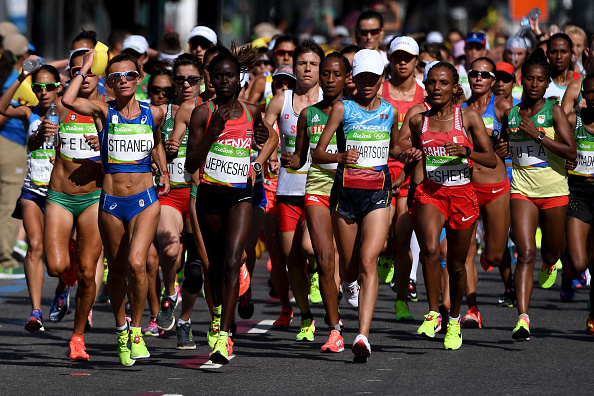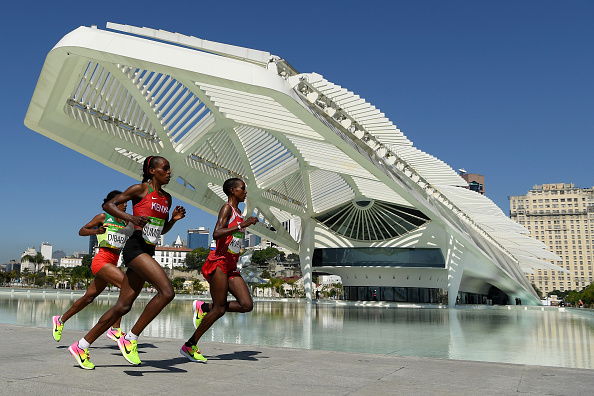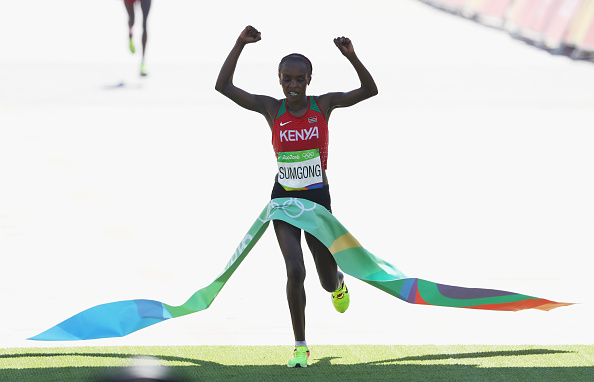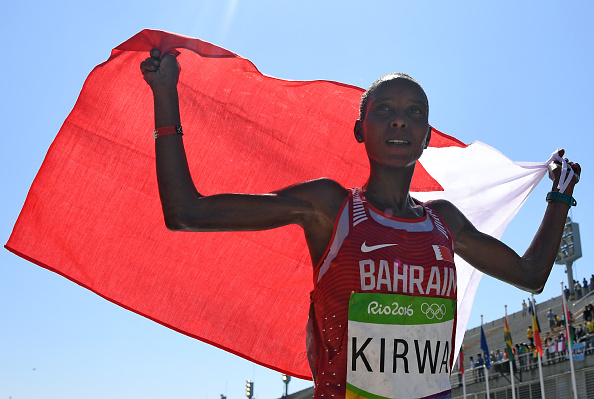The first marathon of 2016 Olympics was completed today, with the ladies taking the stage on the streets of Rio de Janeiro. After two hours and 24 minutes, Kenya celebrated their first female Olympic gold medalist in the marathon with Jemima Jelagat Sumgong, while Bahrein's Eunice Jepkirui Kirwa brought her country the silver medal, the first silver in Bahrein's history. World Champion Mare Dibaba from Ethiopia won the bronze medal. 133 out of the 157 athletes managed to finish, making their own, personal history, running 42.2 kilometers at the Olympics.
First half
The first surprise of the marathon came before the 10 kilometers mark with European half marathon Champion in Amsterdam, Sara Moreira, stopping her race. None had really stood out in the first ten kilometers with a group of around fifteen athletes running all together with all the big names from Kenya and Ethiopia there and with the Americans as well, which were following an interesting tactic.

Later, another huge shock came with medal contender from Ethiopia, Tigist Tufa, as she injured herself and pulled out of the race. Tufa was in the leading group for all the first ten kilometers. Near the 20-kilometer mark Belarussian Volha Mazuronak came close to the leading group, while Kim twins from North Korea and Tomomi Tanaka from Japan made a chasing group of the leaders. Half time came with all the Kenyans being in the leading group, alongside with the Ethiopians remaining after Tufa's injury. Joining them in the leading group were Kirwa and Chelimo from Bahrein, the Belarussian, and two Americans, while Linden, the third from the Americans had fallen behind.
In the whole first half, the leading group consisting of the Kenyans, the Ethiopians, and the Bahrainis remained unbothered, apart from Tufa's injury, while the Americans kept chasing them close. Mazuronak from Belarus was the surprise entrant.
Second half
In the start of the second half, Kenya took a major hit at their chances for a medal, as Jepkesho started losing her powers and falling behind, leaving only Kiprop and Sumgong in the leading group. At that point, the leading group was consisting of two Ethiopians, two Kenyans, two Bahrainis, two Americans and the Belarusian, as we were reaching the 30-kilometer mark. The 30-kilometer mark is really important for the marathon runners, as, it is there when the body starts getting really tired. From that checkpoint, the "hunger games" start, and the ones who have more power left will be the ones to succeed in the end.
Kenya lost another important hope for a medal after the 30-kilometer mark, as Kiprop stopped and left the race, while for the Americans, Cragg fell behind the leading group, leaving only Flanagan to represent the United States in the leaders. However, Desiree Linden, who had fallen off the group before, was trying to catch up.

No athlete had tried to build a lead before the final seven minutes and the group of the seven athletes was holding firm for that time. Before the athletes hit the 40 kilometers, though, Dibaba, Kirwa, and Sumgong opened up and started building a lead from the rest as they were heading towards the finish line. It was a battle between the three for the gold at that time. A battle between Kenya, Ethiopia, and Bahrein for who will be the woman to hold up for gold, as the rest of the athletes from the group were left behind.
The first of the three to lose track, quite surprisingly, was World Champion Mare Dibaba. Dibaba was not able to keep up with Kirwa's and Sumgong's pace and ended running alone, trying to defend her position on the podium. In the final meters before entering the Sambodromo for the finish line, Sumgong passed Kirwa and took a lead. Quickly, it was evident that Kirwa did not have the power to chase down the Kenyan and Sumgong secured the gold medal ending the race first, in two hours, twenty-four minutes and four seconds. Nine seconds later, Kirwa secured the silver medal for Bahrein and sixteen seconds after Sumgong's finish, Mare Dibaba ended third, managing to take the bronze medal for Ethiopia.
Finish

Despite the fact that the race was not near any record, either Olympic or World, it was a historic race, especially for the medalists. The conditions were not easy in Rio. The road that the athletes had to run did not offer any shadow and they had to deal with the heavy sunlight. However, the strongest ones with the best tactic managed to reach the podium and make history for themselves and for their countries. Silver medalist Jepkirui Eunice Kirwa became Bahrain's most successful athlete at Olympics ever, as she won the second medal of her country's history at Olympics and the only one other than bronze.

Meanwhile, in a really surprising record, Sumgong was the first woman to win an Olympic gold for Kenya in a marathon. Last but not least, Mare Dibaba tried to become just the second woman to win the marathon in both the world champs and the Olympics but she fell short of doing so, winning only the bronze medal. Overall, 133 athletes managed to finish the race, but with only three of them hitting a new personal best, mainly due to the conditions in Rio, which were aforementioned.









































